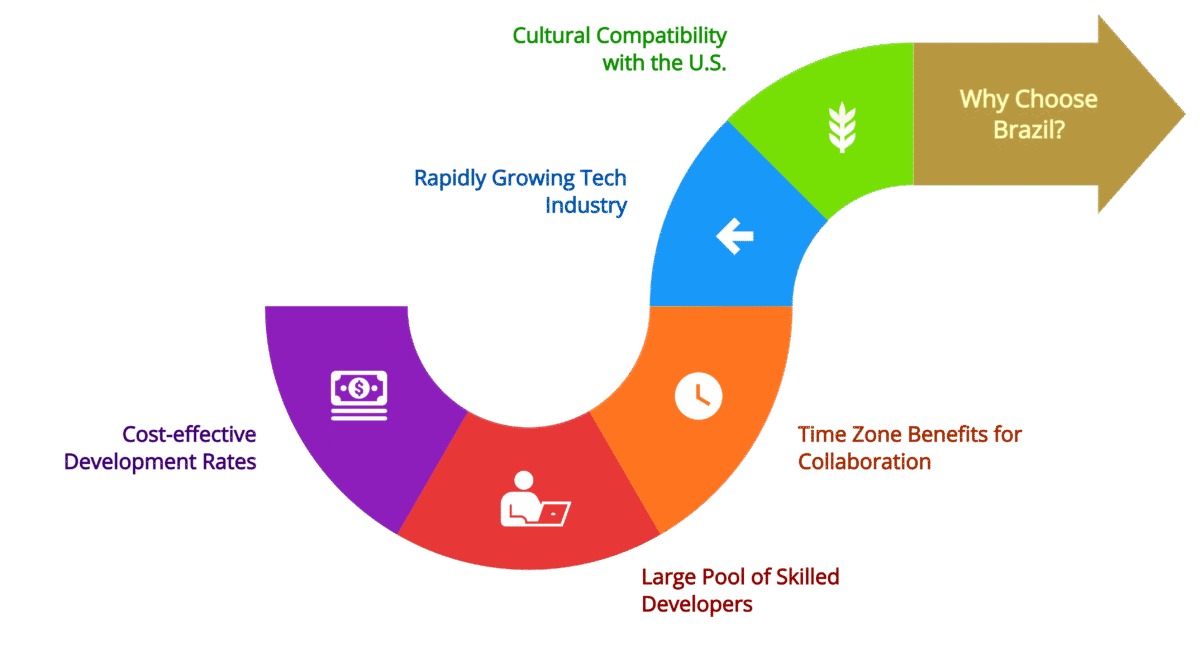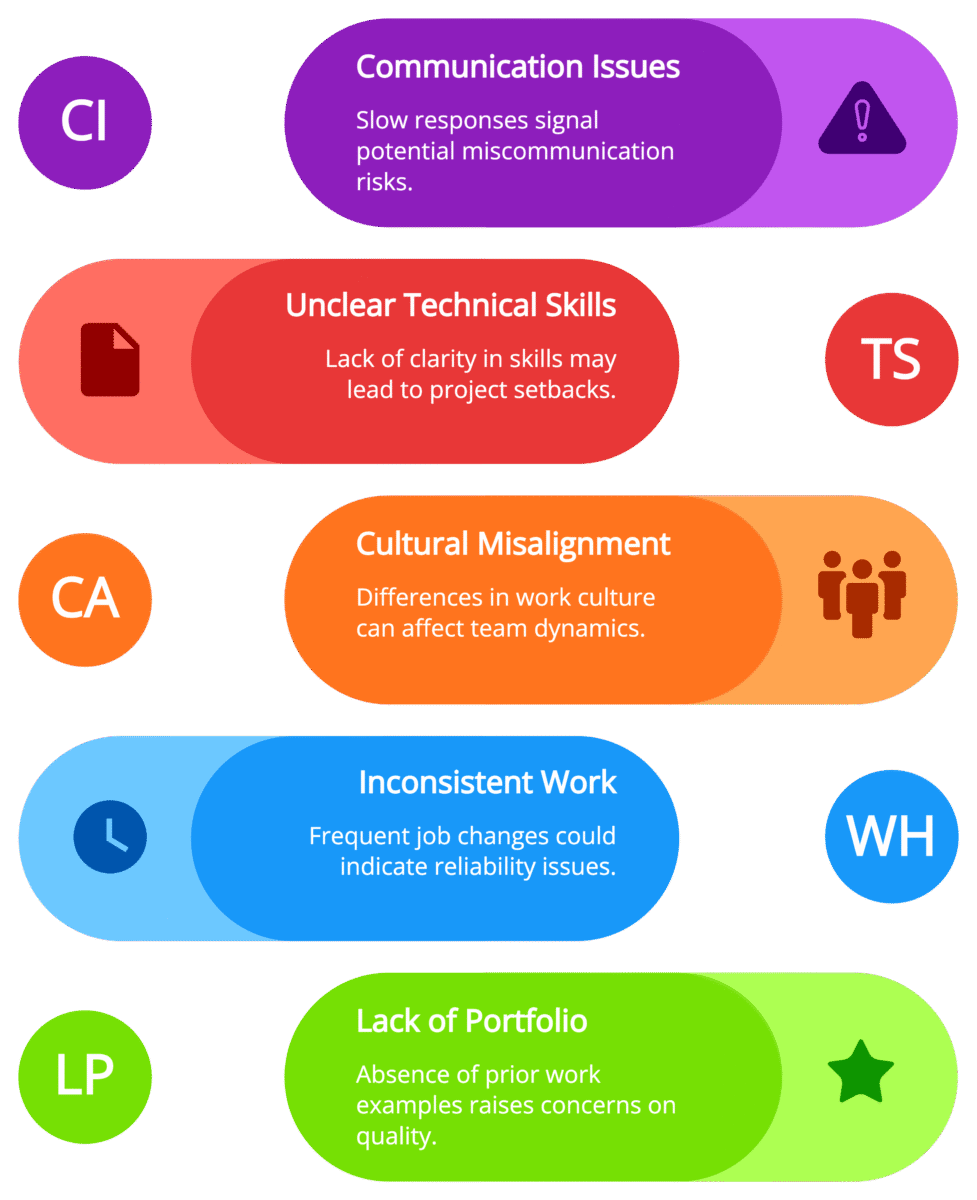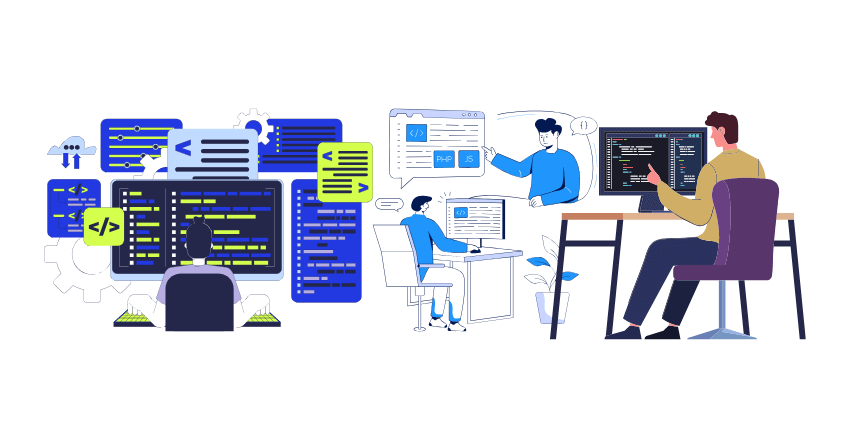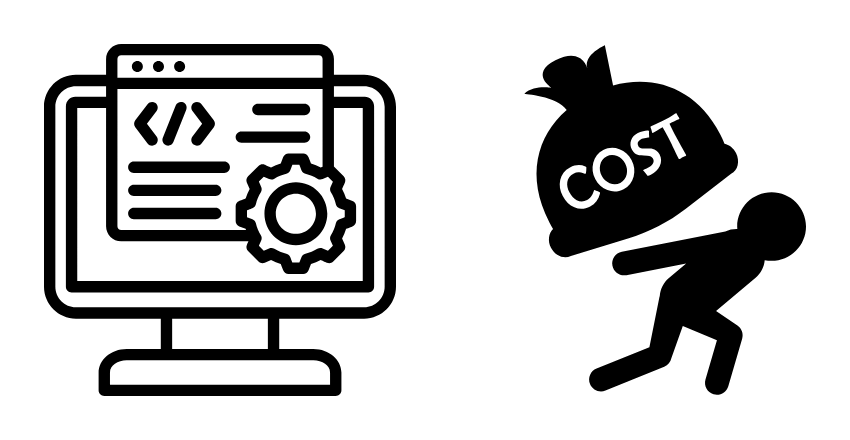If you’re a startup, you probably know how tricky it can be to hire top-notch developers without blowing your budget. The good news? Nearshore developers from Brazil can offer the perfect balance of high-quality skills at lower costs. Startups across North America and Europe are catching on and turning to Brazilian talent to grow their tech teams.
What Is Nearshore Development?
Nearshore development means outsourcing work to a nearby country. Companies often choose nearshore teams to benefit from similar time zones, better communication, and cultural similarities. It bridges the gap between offshore (farther away) and onshore (in-house) outsourcing.
For example, a startup in the U.S. might work with developers from Brazil since the time zones are fairly close. This setup makes collaboration easier, especially compared to offshore options like India or the Philippines.
Why Choose Brazil for Nearshore Development?

Brazil has become a major player in the global tech scene. With a large number of skilled developers and a tech industry that’s constantly growing, it’s a goldmine for startups. Here’s why:
1. Cost Savings Without Sacrificing Quality
Hiring developers in the U.S. or Europe can cost a fortune. In Brazil, developer rates are much more affordable, often ranging from $30 to $50 per hour, depending on experience and expertise. But here’s the kicker—Brazilian developers are highly skilled in programming languages like Python, Java, and JavaScript. They can deliver work on par with developers from Silicon Valley.
2. Time Zone Compatibility
Brazil’s time zones are close to the U.S., which makes real-time collaboration easier. For example, São Paulo is just 2-3 hours ahead of New York. No more midnight Zoom calls just to catch your developers online!
3. Strong Tech Community
Brazil’s tech scene is thriving, with major cities like São Paulo, Rio de Janeiro, and Florianópolis becoming tech hubs. Developers stay up-to-date with the latest trends through events like the Campus Party Brasil and The Developers Conference (TDC). This means you get tech pros who know what’s up in the industry.
How to Find the Right Developers
Not all developers are created equal, so it’s important to find the right fit for your startup. Here’s how to go about it:
1. Look for Trusted Platforms
Check out job platforms that specialize in remote or nearshore talent, like:
These platforms have vetting processes to ensure you’re hiring experienced developers.
2. Conduct Thorough Interviews
Ask technical and situational questions to see how candidates handle real-world problems. For example:
- “How would you handle a last-minute change in project scope?”
- “Can you walk me through a time you optimized a slow-running piece of code?”
This will help you gauge both their technical skills and problem-solving abilities.
3. Start with a Small Project
Before fully committing, assign a smaller task to test how well the developer performs. This lets you evaluate their work quality, communication style, and ability to meet deadlines.
Benefits of Nearshore Developers for Startups

Let’s summarize why startups are leaning toward nearshore developers from Brazil:
| Benefit | Explanation |
|---|---|
| Cost Savings | Lower rates for high-quality work |
| Time Zone Alignment | Overlapping work hours for smoother communication |
| Skilled Workforce | Developers experienced in top programming languages |
| Cultural Compatibility | Fewer communication barriers and misunderstandings |
Examples
1. Nubank’s Growth
Nubank, one of the world’s largest digital banks, has its roots in Brazil. They leveraged local talent to build a user-friendly app that disrupted the financial industry. Today, they serve millions of customers across Latin America.
2. U.S. Startups Partnering with Brazilian Talent
Several U.S.-based startups have reported improved productivity and faster project turnarounds by hiring nearshore teams from Brazil. One startup CEO mentioned that working with Brazilian developers “felt like having an in-house team, without the crazy costs.”
Red Flags to Watch for When Hiring Nearshore Developers

When hiring nearshore developers, not every candidate will be a perfect fit. Knowing what to watch out for can help you avoid costly mistakes that can slow your startup’s progress.
1. Poor Communication Skills
Clear, timely communication is critical in remote teams. If a candidate takes too long to respond, struggles to explain technical concepts, or has difficulty understanding your requirements, that’s a red flag. Miscommunication can lead to delays, errors, and misunderstandings in your project.
How to test communication:
- Set up a video interview to evaluate language fluency and professionalism.
- Ask them to explain a previous project to gauge their ability to communicate complex ideas.
- Test response times during the hiring process to see how quickly and clearly they follow up.
2. Lack of Portfolio or Work Samples
Developers with strong experience typically have a portfolio of projects they’ve worked on. If a candidate cannot provide relevant examples, be cautious. They might not have the hands-on experience needed to meet your project requirements.
What to look for:
- Repositories (like GitHub) showing active work on coding projects.
- Completed projects with live URLs or apps.
- Client testimonials or references that verify their contributions to past projects.
3. Unclear or Unreliable Availability
If a developer has unpredictable work hours or isn’t transparent about their schedule, it can create bottlenecks in your workflow. This is especially problematic in startups where rapid iteration is key to staying ahead.
Questions to ask:
- “What are your regular working hours in our time zone?”
- “Do you have other commitments that may affect your availability?”
- “How do you handle urgent tasks or deadline changes?”
Look for developers who are upfront about their availability and can commit to a consistent schedule.
4. Unrealistic Rates (Too High or Too Low)
A candidate charging far below market rates may lack experience or might not be committed to long-term collaboration. On the flip side, those charging sky-high rates should justify their pricing with proven expertise and case studies.
How to assess rates:
- Compare their rates to the average in Brazil (typically $30 to $50/hour for skilled developers).
- Ask for a breakdown of their pricing, including services offered, to see if it aligns with your expectations.
5. Lack of Collaboration Tools or Processes
Developers who don’t use standard collaboration tools (like Git, project management platforms, or time tracking) may not be equipped to work with remote teams. This can lead to confusion, lack of documentation, and delays in deliverables.
What to ask:
- “What tools do you use to manage tasks and track progress?”
- “How do you handle version control in your code?”
- “How do you report updates and share project status?”
Look for developers familiar with tools like Jira, Trello, GitHub, and Slack to ensure they can integrate smoothly into your team.
6. Inconsistent Work History
Developers who frequently jump between projects without long-term commitments may be unreliable. While freelancers often work on multiple short-term projects, a history of consistently unfinished or poorly reviewed work should raise concerns.
How to evaluate work history:
- Review their LinkedIn or job platform profiles to see the length of previous contracts.
- Request references from previous clients to verify their reliability and work ethic.
Avoiding these red flags can save your startup time, money, and frustration. By thoroughly vetting candidates for communication skills, portfolios, reliability, and collaboration habits, you increase your chances of finding a nearshore developer who fits your needs perfectly.
Hiring nearshore developers from Brazil can be a game-changer for startups looking to scale without spending a fortune. You’ll get high-quality work, real-time collaboration, and a team that understands your business needs. With Brazil’s booming tech industry, now is the time to tap into this talent pool.
FAQs: Hiring Nearshore Developers from Brazil
1. How much can I save by hiring nearshore developers from Brazil?
You can save 30-60% on development costs. In Brazil, hourly rates for developers typically range between $30 and $50, compared to $100+ per hour for developers in the U.S. or Europe. Despite lower costs, the quality of work is comparable, thanks to Brazil’s strong tech talent pool.
2. How do I deal with potential language or communication barriers?
Many Brazilian developers have experience working with international clients and speak fluent English. To ensure smooth communication, prioritize candidates with strong language skills and global project experience. Tools like Slack, Zoom, and Asana can also help streamline communication.
3. What are the most common programming skills among Brazilian developers?
Brazilian developers are highly skilled in popular programming languages and frameworks, such as:
- Python
- Java
- JavaScript (React, Node.js, Vue.js)
- Ruby on Rails
- PHP and Laravel
Brazil’s developers are also experienced in mobile app development (iOS and Android) and cloud services like AWS, Azure, and Google Cloud.
4. What are the legal or contractual considerations when hiring nearshore developers?
When working with nearshore developers, it’s important to sign contracts that include:
- Scope of work and deliverables
- Payment terms
- Confidentiality and non-disclosure agreements (NDAs)
- Intellectual property (IP) rights
Platforms like Toptal and Upwork offer built-in contract management and dispute resolution to protect both parties. You can also consult an international legal expert to ensure compliance with labor and tax laws.
5. How do time zone differences impact project collaboration?
Time zone alignment is a key benefit of nearshore outsourcing. For U.S. startups, Brazilian developers typically work during overlapping business hours. For example, developers in São Paulo are only 2-3 hours ahead of major U.S. cities like New York or Chicago. This allows for real-time communication and faster project iterations without the need for late-night or early-morning meetings.












